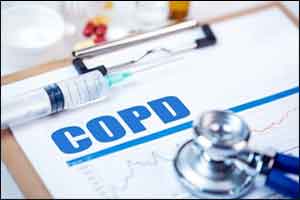- Home
- Editorial
- News
- Practice Guidelines
- Anesthesiology Guidelines
- Cancer Guidelines
- Cardiac Sciences Guidelines
- Critical Care Guidelines
- Dentistry Guidelines
- Dermatology Guidelines
- Diabetes and Endo Guidelines
- Diagnostics Guidelines
- ENT Guidelines
- Featured Practice Guidelines
- Gastroenterology Guidelines
- Geriatrics Guidelines
- Medicine Guidelines
- Nephrology Guidelines
- Neurosciences Guidelines
- Obs and Gynae Guidelines
- Ophthalmology Guidelines
- Orthopaedics Guidelines
- Paediatrics Guidelines
- Psychiatry Guidelines
- Pulmonology Guidelines
- Radiology Guidelines
- Surgery Guidelines
- Urology Guidelines
GOLD COPD Guidelines Revisited

Global Initiative for Chronic Obstructive Lung Disease (GOLD) released new its findings and recommendations on COPD to update and address the role of treatment in the disease. Dr. Paul Scanlon, a Mayo Clinic pulmonologist has written an article to review of the same and that has appeared in the latest issue of Mayo Clinic Proceedings.
Chronic obstructive pulmonary disease remains the third leading cause of death in the U.S. It is a chronic inflammatory lung disease that causes obstructed airflow from the lungs. Emphysema and chronic bronchitis are the two most common conditions that contribute to COPD. The patient complains of breathing difficulty, cough, excessive mucus production and wheezing. It's caused by long-term exposure to irritating gases or particulate matter, most often from cigarette smoke.
Global Initiative for Chronic Obstructive Lung Disease issues review of new COPD research and updates treatment recommendations from time to time.
Among findings from the 2018 report, Key recommendations are :
- Influenza and pneumococcal vaccinations are recommended for patients with COPD.
- Pulmonary function is essential in establishing a diagnosis but is underutilized.
- Treatment algorithms in the new guidelines have been simplified to rely mainly on symptoms and exacerbation frequency to determine specifics of therapy.
- Other health conditions, particularly lung cancer and heart disease, play an important role in the health of those with COPD. Thus, prevention and vigilance against these conditions is important.
- The panel stresses the need for education, training, and assessments at every visit, especially with the often complex medication-delivery devices that are part of treatments.
For current COPD patients, there are ways to lower risk and manage symptoms which include
- Smoking cessation, regardless of how bad your lung function is.
- When you quit smoking, lung function improves slightly and declines at a slower rate thereafter.
- Even smokers with lung cancer or heart disease live longer and have a better quality of life if they quit.
- If you have frequent exacerbations, treatment with inhaled corticosteroids, combination inhalers, or long-acting bronchodilators can reduce their frequency.
“The majority of people with COPD have mild disease that requires very little treatment other than smoking cessation and possibly a short-acting bronchodilator,” Dr. Paul Scanlon, a Mayo Clinic pulmonologist and the article’s senior author, said in the press release. “For the minority of people with more advanced disease, current therapy is very effective, improves symptoms and quality of life, increases exercise tolerance, and reduces the frequency of exacerbations.” In the past, health care providers were pessimistic about treating COPD,” says Dr. Scanlon. “With appropriate therapy, those attitudes are outdated.”
COPD is a common and preventable disease with a large majority of patients benefiting greatly from appropriate therapy.

Disclaimer: This site is primarily intended for healthcare professionals. Any content/information on this website does not replace the advice of medical and/or health professionals and should not be construed as medical/diagnostic advice/endorsement or prescription. Use of this site is subject to our terms of use, privacy policy, advertisement policy. © 2020 Minerva Medical Treatment Pvt Ltd